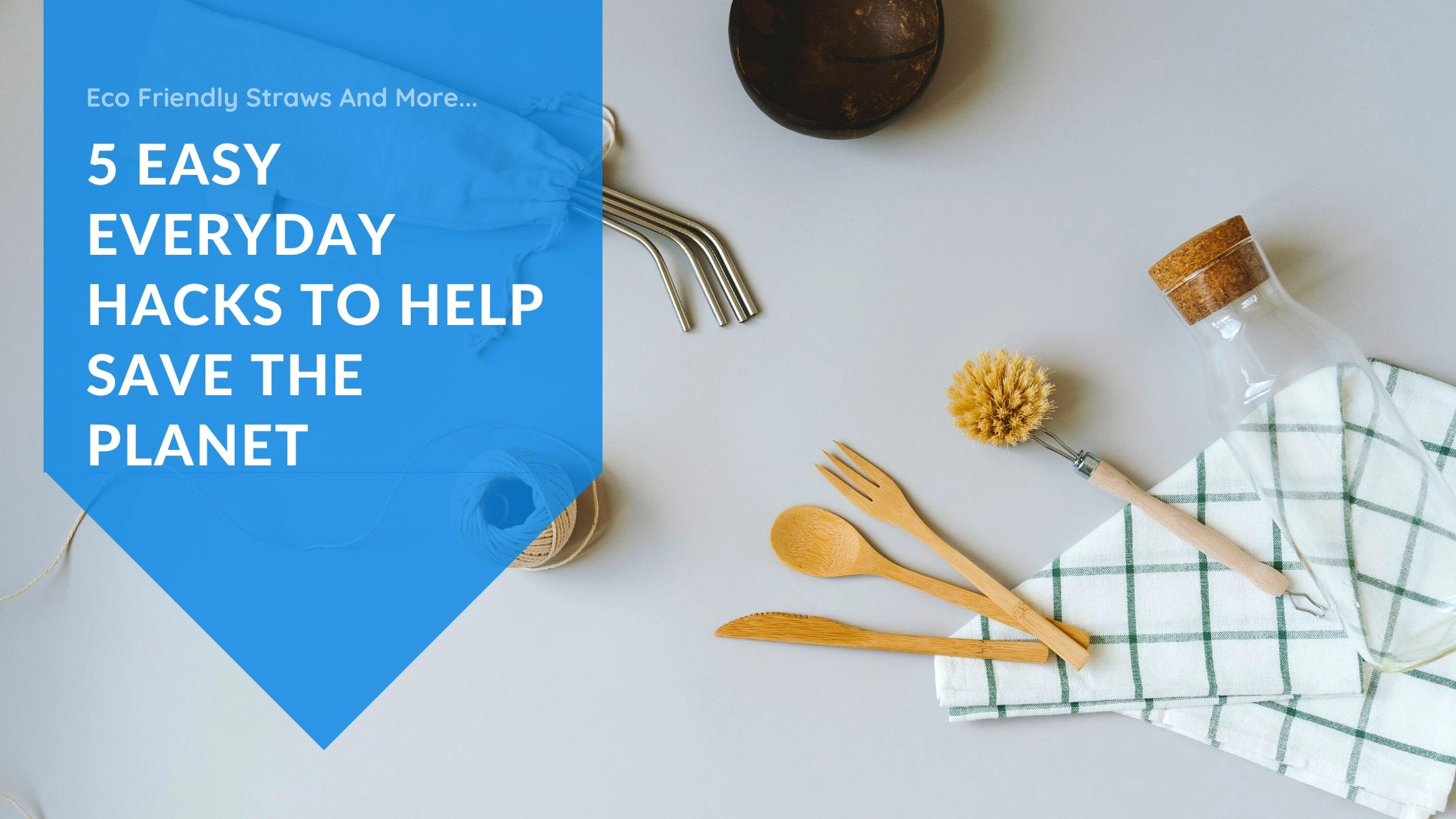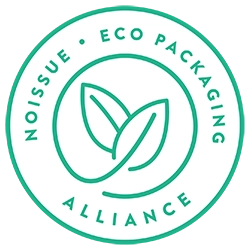5 easy, everyday hacks to help save the planet

Saving the planet starts with little acts; things we can all easily accomplish on a daily basis, like using reusable or edible straws instead of disposable plastic ones, or turning off the water when we brush our teeth. Easy things.
With the polar ice cap melting faster than ever, animal species disappearing in the blink of an eye and the Earth feeling the effects of greenhouse gases like never before, it’s no wonder there are thousands of people out there who wish they could simply figure out the “one thing” that would solve climate change. Let’s face facts though: we all know that there isn’t just “one thing.” It’s more like taking into account all our actions and thoughts and how they might affect the planet. Because, we have to remember – with life and our survival – we’re all in this together.
“But I’m just one person. How could I possibly make a difference?” We’ve all thought about this one a lot but that’s exactly it – we all think it. We all can make that “one thing” happen by making little daily differences together. That is what really makes the big difference in the end. Think of it as a climate snowball effect. You do something better, I do something better and it catches on until it’s just second nature to everyone.
So where to begin? From using edible straws on the regular to learning how to balance our meat-loving food habits with a vegetarian option for diets, we can easily help the planet in our everyday lives. It’s easier than you think. Here’s how-
Say Good-Bye to Single Use Plastic. Think Reusable.
Did you know that we produce over 300 million tons of plastic each year? That’s nearly the weight of the entire human population. Of this, approximately half is designed to be used once and thrown away. This means there’s a whole lot of plastic waste out there that will take between 200-1000 years to biodegrade. We can speed up that clock a wee bit and decrease some of that tonnage through a few quick changes around the house:
- Take reusable shopping bags on your next quick trip to the grocery store. They may cost $1-3 but the returns are in the millions.
- Use biodegradable plates and utensils instead of plastic ones at the next barbecue or party you host. Add in some cool edible straws, and you’ll be the life of the party while giving back life to the planet.
- Buy a reusable water bottle and refill at water fountains through the day. It’s easy on the budget and the planet. Win-win. Shift from thinking one-time use to reuse. It’s simple, straightforward and budget friendly. No more plastic. Hello edible straws, canvas shopping bags and steel water bottles. The planet and your wallet will immediately thank you.
Make Little Adjustments with Appliances.
This one is all about making small tweaks to how you use appliances around your house. Nothing monumental. Not using the toaster today? Unplug it. Leaving a room? Turn off the light. Not only will such habits save you $100-$200 in electricity bills per year but it will also help you decrease your carbon footprint.
The same can be said for your daily use of water. Try only using your washer and dryer when you have a full load. Go the extra mile and replace your shower head with a low-flow one. It might cost you a little bit up front but it will pay back when you see your next water bill. Small changes and a few upgrades to your appliances and water usage also with using reusable utensils such as eco-friendly straws or similar containers will not only help your budget but also the planet. You can’t get much better than that.
Go Digital When You Can. Junk Mail. Bills. E-Tickets. All of It.
Let’s admit it together – we probably use more paper than we really need to. Most of the time when we receive mail or pamphlets or even print something out, it’s usually for a one time occasion. Just like single-use plastic, single-use paper can be harmful for the environment. In fact, it’s estimated that 40% of the total waste produced (in the US at least) is paper waste. So to counter this, go digital. It’s as simple as clicking a button on your account to opt into receiving an email instead of a packet of papers in the mail.
Since the paper industry is the world’s fifth largest consumer of energy, any steps we can take to reduce unnecessary or wasteful use slowly restore the balance between us and the planet. Eco-friendly straws, e-ticket use and porcelain plates look better and better when we fully realize the impact of these facts.
How can we jump into doing this? Take an hour out and make it a point to log into all of your accounts to opt into paperless billing, e-ticket purchases or digital magazine and book orders. Take the quick step and save a tree in the process.
Skip The Meat Just One Day A Week.
Many of us just love our hamburgers and bacon. It’s completely understandable. It’s a heaven of deliciousness, after all, but let’s take a step back. Meat consumption is one of the most harmful activities to the environment in the modern world.
Although the majority of livestock related greenhouse gas emissions come from developing countries (accounting for about 75% of the total global cattle emissions alone), it is the demands of everyone who eats meat on planet Earth, particularly those in developed countries, that contribute to the growth and negative impacts of the global meat industry. For this one, you have to think about the entire value chain, not just that succulent pork chop you’re eating right now.
One easy way to mitigate our love for the meats is to cut back to veggie options by just one day a week. Six days for meat, one day without. Pretty easy deal. While a full vegetarian diet can have 2.5 times less carbon emissions than a meat diet, reducing our meat consumption by just one day will move us toward a more sustainable way of living.
So, switch out that plastic knife and fork and ribeye steak dinner with some reusable cutlery, and a set of fruit and vegetable smoothies. This trade-off lends a hand to improving our relationship with the world around us. Plus you’ll make your mom proud that you’re eating your veggies finally.
We Have Two Legs, So Let’s Use Them.
Walking, biking or even rollerblading are all great ways to not only help save the planet but also burn a few calories along the way. Think of it this way – you’re approaching your regular workouts from a new angle while also helping to reduce greenhouse gases and your carbon footprint at the same time. The world is a pretty big and awesome place.
By biking or walking to work, you might get the chance to see parts of your neighborhood or town you never knew existed. Give it a try and see how it goes for you. It might just become your favorite new thing.
To explore this hack, see how walkable your neighborhood is. You’d be surprised how much is within a 15 minute walk from your house. If biking or walking is not an option, look into your local mass transit system or pull some friends together for a rideshare or carpooling program. Each car off the road is another step toward reducing air pollution.
If a Car is an Essential, Go Green.
Understandably, cars are an essential part of many people’s lives and can’t easily be removed due to location, occupation or similar reasons. Next time you’re in the market to buy a car, however, look toward green or fuel efficient vehicles. Whether it is an electric, hybrid or biodiesel car, there is one out there that will fit your lifestyle and the lifestyle of the planet.
Electric vehicles (or EVs for short) hold a plethora of different advantages ranging from decreased emissions output to reduced fuel bills. For the average EV currently on the road, it has the same greenhouse gas emission rate as a gasoline-based car that gets 80 miles to the gallon.
That’s a pretty stark difference from the average gas-powered car which sees approximately 25 miles to the gallon and certainly a benefit to our planet. Pair this with the fact that as an EV owner, you no longer have to fill up your gas tank and overall maintenance is lower. This in turn saves you about $800 a year in gas bills and $1,500 in maintenance on the first 150,000 miles you put on your car.
When the time comes to buy a new car, check out the Environmental Protection Agency’s Green Vehicle Guide for awesome insights and tips to your next planet-friendly purchase. You’ll be saving big for both yourself and the planet.
From vowing to use reusable cutlery and edible straws, to reducing our carbon footprint either via foot or EV, these are a number of easy ways in which we can curb our excessive habits and take necessary steps towards having a more sustainable lifestyle. Eat a bit less meat. Wait until the laundry bin is full to wash clothes. Say bye-bye to single use plastic. Check, check and check. Take it all step-by-step. Tackle one thing at a time and you’ll be living your best, sustainable life in no time.

